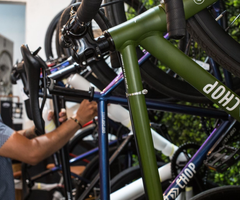MI SELECCIÓN DE NOTICIAS
Noticias personalizadas, de acuerdo a sus temas de interés

Bank’s credit line to fintech firm Credijusto is latest example of growing market of alternative lenders to local business
Fintech investors are flocking to Mexico to try to fill a gap in the country’s credit market: loans to young businesses looking to expand.
The latest example is Goldman Sachs Group Inc., which is providing a credit line of up to $100 million to Credijusto, a four-year-old financial technology firm in Mexico City backed by former Morgan Stanley Chief Executive John Mack and Capital One Financial Corp. co-founder Nigel Morris.
Credijusto, founded by David Poritz, age 30, and Allan Apoj, 29, who met as classmates at Brown University, specializes in making three-year loans to small businesses, like taxi fleets, taco restaurants and farms.
Goldman’s involvement is a reminder of how small fintech companies are challenging and reshaping the banking industry, especially in developing markets like Latin America.
The bank’s commitment is also the largest of a flurry of recent fundraising efforts by alternative lenders in Latin America. A lack of credit is keeping many small businesses in Mexico from growing and, economists say, holding back broader economic expansion. Last month, Mexico’s central bank sharply reduced its 2019 gross domestic product growth forecast.
More than half of Mexican workers are employed by businesses in the informal sector, meaning their employers don’t pay taxes or contribute to workers’ Social Security benefits. That can make it difficult for them to get bank loans, which means they tend to stay small.
“Credit is the fuel for growth, the same way gasoline makes a tractor-trailer run,” said Sergio Luna, chief economist at Citibanamex in Mexico City.
The bulk of lending by Mexican banks targets large corporations, home mortgages and consumers, according to the Bank of Mexico. More than 80% of Mexican small businesses rely primarily on supplier financing, not bank credit, Banxico said.
A host of new online lending platforms and supply-chain financing services have popped up in recent years in Mexico to help fill the void, said Andres Fontao, a co-founder and managing partner of Finnovista, a firm that advises fintech startups.
“I think the traditional banks do see an opportunity,” Mr. Fontao said. “But they aren’t yet willing to take on that risk for the returns available.”
Among other entrants that have been raising money from venture capitalists, hedge funds and others: Konfío, an online small-business lender based in Mexico that has a partnership with PayPal Holdings Inc. ; Kueski, a consumer-lending platform; and PayClip, a Latin American version of payments firm Square Inc.
Credijusto relies on a trove of data gleaned from tax invoices, which were digitized in Mexico under a tax reform law in 2014, and other data to determine a borrower’s creditworthiness and assess risk. The average loan size is between $150,000 and $200,000. The average annual interest rate is high, about 27%.
The company has grown rapidly, distributing about $10 million in loans and equipment financing in 2017 and $35 million in 2018. This year, Credijusto expects to lend more than $125 million, double its workforce to about 250 employees and launch several new lending products.
About 3% of Credijusto’s borrowers default on their loans. The company says it was profitable last year.
The company’s co-founders said a shared interest in Latin America led them to examine the region. Mr. Apoj grew up in Mexico City and Miami and interned at Mexico’s Finance Ministry, and Mr. Poritz founded a nonprofit focused on reducing the social and environmental impact of energy projects in South America in 2008.
Through a friend, Mr. Poritz pitched Mr. Mack, the former Morgan Stanley CEO, and persuaded him to invest. Mr. Morris was an early investor through his QED Investments.
Mr. Mack said he liked that many of the loans are to family-owned companies. “If the whole family is dedicated to the business, and there’s an opportunity to grow, that’s a bet I’ll take,” he said.
Jason Nassof, a vice president with Goldman Sachs’ special-situation group who arranged the deal, said the fintech landscape “is significantly less crowded in Mexico than it is in the U.S.”
“There are openings for companies to grab market share,” he said.
Credijusto hopes to help more businesses like Chop Chop Bikes, a bicycle manufacturer with a shop and factory in Mexico City that launched in 2017, designing lightweight, high-end bicycles.
Last year, after two rounds of fundraising from family and friends, Chop Chop needed a loan but couldn’t get one from a bank because of its short record of sales.
Chop Chop turned to Credijusto and within days had a loan for 980,000 pesos (about $50,000), with an annual interest rate of 27%. It used the money to order parts from China, Japan and South Korea.
“In Mexico, you can open up a business in three weeks flat, but growth is a whole other problem,” said Andrés Vera, one of four partners who own the company. “It’s easy to get stuck on the same street corner, with a nice little shop, for years and years before you can expand.”
By Robbie Whelan
El préstamo otorgado por Hsbc y el Banco Santander se suma a los US$ 532 millones obtenidos en 2024.
La caída de los recursos provenientes del petróleo, históricamente una de las principales fuentes de financiamiento fiscal del país, fue uno de los factores determinantes en el deterioro de las cuentas públicas
En un comunicado oficial, las autoridades reafirmaron que Perú sigue preocupado por las consecuencias humanitarias y territoriales del conflicto en Europa del Este